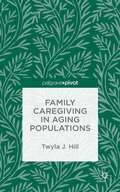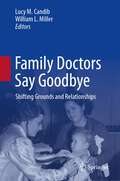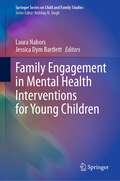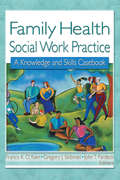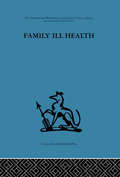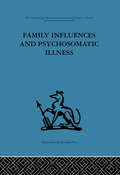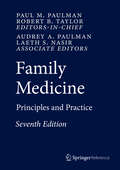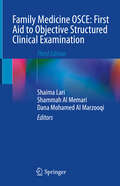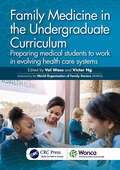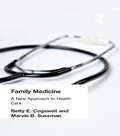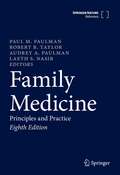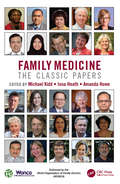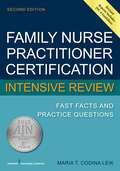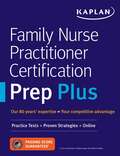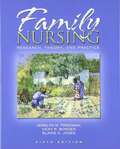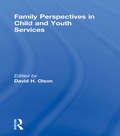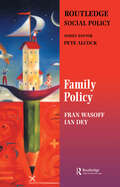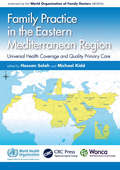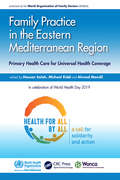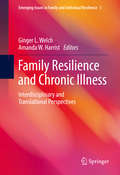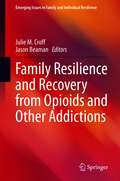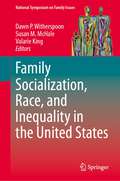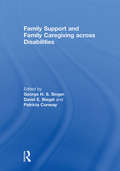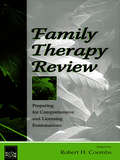- Table View
- List View
Family Caregiving in Aging Populations
by Twyla J. HillFamily members are increasingly likely to provide caregiving for older adults as the US population ages. This book summarizes what we know about caregiving by spouses and other intimate partners, adult children, siblings, grandchildren, friends, and other relatives, as well as by members of racial, ethnic, and sexual minority groups.
Family Doctors Say Goodbye: Shifting Grounds and Relationships
by William L. Miller Lucy M. CandibThis book considers the family doctor relationship and the process of ending that relationship. What happens when a family doctor or someone like them, deeply committed to long-term relationships, decides to end those commitments? What’s involved? What are the embodied experiences for doctor and patient, for doctor and staff, for physician leader and others? What comes next? This book invites the reader to immerse in personal stories and reflections of family physicians who choose to retire from practice, depart long-standing leadership roles, or shift from one place of deep relational commitments to something else. These stories concern the particulars of family medicine and general practice, but they share much with any vocation rooted in the duties, challenges, and rewards of relationships bound by covenant and not transaction. This book is relevant to all professionals involved in healing relationships.
Family Engagement in Mental Health Interventions for Young Children (Springer Series on Child and Family Studies)
by Laura Nabors Jessica Dym BartlettThis book examines the critical nature of engaging families in mental health interventions that promote well-being and resilience in young children, from birth to 8 years of age, with a particular focus on the importance of equity and systems of care. It addresses evidence-based and evidence-informed interventions to promote family engagement to improve behavioral, social, and emotional functioning of infants and toddlers, preschoolers, and children in the early elementary school years. The book is grounded in empirical knowledge on reducing health disparities and promoting equity in mental health care for young children, including equitable access, services, and outcomes. It emphasizes a community-based systems of care approach to family engagement in mental health interventions and highlights the most promising policies and practices.Key areas of coverage include:Mental health interventions for different developmental levels, including infancy and toddlerhood, the preschool years, and in early elementary school.Inequities and gaps in systems of care for young children.Evidence-based and evidence-informed prevention practices and intervention strategies to engage families and support children’s psychological well-being.Family engagement in interventions for young children with special needs or who are recovering from trauma. Family Engagement in Mental Health Interventions for Young Children is a must-have resource for researchers, professors, and graduate students as well as clinicians, therapists, and other professionals in developmental psychology, child and adolescent psychiatry, family and systems therapy, school and clinical child psychology, social work and counseling, pediatrics and school nursing, and all interrelated disciplines.
Family Health Social Work Practice: A Knowledge and Skills Casebook (Non-ser.)
by Francis K.O. Yuen Gregory J SkibinskiA fundamental handbook to the family health model!Family Health Social Work Practice: A Knowledge and Skills Casebook is a comprehensive guide to an emerging practice paradigm in the social work field. Edited by pioneers of the family health approach (who also contribute several chapters each), this book introduces the theoretical model and skills of the practice, including a framework for developing a family health intervention plan, illustrated by case scenarios. Issues vital to any family health intervention are addressed in 10 case studies that further explain the application of the practice model.Family Health Social Work Practice stresses a holistic orientation to assessment and intervention from a health perspective that includes the physical, mental, emotional, social, economic, cultural, and spiritual dimensions of family life. With its focus on practice theories, practical information, and evaluation strategies, the book provides a strong foundation for skills development in the family health model. A collection of articles from the leading practitioners and academics in the field gives a thorough and thoughtful examination to issues ranging from domestic violence to substance abuse to the Americans with Disabilities Act.Family Health Social Work Practice also reviews the philosophy behind the family health approach, summarizes its effectiveness, and examines other critical concerns, such as: child maltreatment mental health spiritual diversity aging agency managementOne of the few casebooks to present practical intervention plans with accompanying case scenarios, Family Health Social Work Practice is an essential resource for students and professionals in the social work and human services disciplines, and an unrivaled reference for libraries. Helpful tables and figures make the information easy to access and understand.
Family Ill Health: An investigation in general practice
by Robert KellnerTavistock Press was established as a co-operative venture between the Tavistock Institute and Routledge & Kegan Paul (RKP) in the 1950s to produce a series of major contributions across the social sciences. This volume is part of a 2001 reissue of a selection of those important works which have since gone out of print, or are difficult to locate. Published by Routledge, 112 volumes in total are being brought together under the name The International Behavioural and Social Sciences Library: Classics from the Tavistock Press. Reproduced here in facsimile, this volume was originally published in 1963 and is available individually. The collection is also available in a number of themed mini-sets of between 5 and 13 volumes, or as a complete collection.
Family Influences and Psychosomatic Illness: An inquiry into the social and psychological background of duodenal ulcer (International Behavioural And Social Sciences Ser. #Vol. 28)
by E M GoldbergTavistock Press was established as a co-operative venture between the Tavistock Institute and Routledge & Kegan Paul (RKP) in the 1950s to produce a series of major contributions across the social sciences. This volume is part of a 2001 reissue of a selection of those important works which have since gone out of print, or are difficult to locate. Published by Routledge, 112 volumes in total are being brought together under the name The International Behavioural and Social Sciences Library: Classics from the Tavistock Press. Reproduced here in facsimile, this volume was originally published in 1958 and is available individually. The collection is also available in a number of themed mini-sets of between 5 and 13 volumes, or as a complete collection.
Family Interventions Throughout Chronic Illness and Disability
by Paul W. Power Martha Blechar Gibbons Arthur E. Dell OrtoTextbook covering a wide range of disabilities and chronic illnesses. Intended for health, allied health, and other helping professionals.
Family Medicine
by Robert B. Taylor Paul M. Paulman Audrey A. Paulman Laeth S. NasirMedical students will excel in their family practice clerkships with the practical information in this pocket-sized resource! It examines key clinical skills #65533; patients presenting with a sign, symptom, or abnormal lab value #65533; and patients presenting with a known condition-each in its own section for easy reference. Useful illustrations, key points, and clinical cases throughout the text put essential guidance at the reader's fingertips. Describes the special characteristics of a family medicine practice clerkship and provides guidance on working in an office-based community setting. Offers concise guidance on essential diagnostic tests and office procedures. Examines a broad range of physical and mental health issues for male and female patients across the lifespan. Addresses the questions students are most likely to be asked by attending physicians during their clerkship. Helps readers prepare for board exams with USMLE-style questions, answers, and rationales.
Family Medicine OSCE: First Aid to Objective Structured Clinical Examination
by Shaima Lari Shammah Al Memari Dana Al MarzooqiIn this book, a clinician can experience the most typical medical subjects in a primary care setting, which is the highlight. The book brings knowledge and counseling skills into action as it takes you through various scenarios. In addition, it serves as a guide for passing the Objective Structured Clinical Examination, or "OSCE," by mirroring the Middle East and Arab World exam format in a structured fashion. With that, the book left behind distinctive traces that productively revealed its value and reputation.The book chapters provide a systematic approach to patient-centered medical problems, making it easier and handier for the students. The process covers in-depth history remarks, an organized set of physical examinations, and careful counseling tips.
Family Medicine in the Undergraduate Curriculum: Preparing medical students to work in evolving health care systems (WONCA Family Medicine)
by Victor Ng Val WassIt has been recognised by governments and healthcare organisations worldwide that for Universal Healthcare in pursuit of Health for All under the Sustainable Development Goals to be achieved, effective primary care that is integrated, accessible, and affordable for everyone is essential. This practical guide is the first designed specifically to support those planning and conducting family medicine/primary care education within medical schools around the world. It offers medical educators a collection of concise easy to follow chapters, guiding the reader through the curriculum requirements with key references for further detail. Plain English and practical, deliverable advice, adaptable to different contexts, ensures the content is accessible to those educating medical students in any country, while the structure within sections ensures that family medicine doctors and educators can dip into chapters relevant to their roles, for example curriculum design for academic educators or teaching methods for those educating in clinical practice. Key Features ■ The first “how-to” guide dedicated to effective integration of family medicine teaching into medical school curricula ■ Offers a strong evidence-based framework for integrating family medicine into medical schools ■ Wide in scope, for academics and educationalists at all levels and in all geographies, reflecting and embracing the experience and variation in family medicine across the globe to produce pragmatic and effective information on which medical schools can base change ■ Step-by-step introduction to the processes of literature review (establishing the existing knowledge base), choosing a topic, research questions, and methodology, conducting research, and disseminating results ■ Supported by the WONCA Working Party on Education The book is edited and authored by members of the World Organization of Family Doctors (WONCA) Working Party on Education, which is ideally placed to offer a strong platform for medical schools to integrate family medicine whatever the local context, enabling all future doctors, whatever their career aspiration, to understand the importance of family medicine to health systems and holistic medicine and encourage family medicine doctors to inspire students to consider a career in the field.
Family Medicine: A New Approach to Health Care
by Marvin B Sussman Betty E CogswellHere is an insightful review of the origins of family medicine as an AMA-approved specialty, including the difficulties in developing the role of family physician.
Family Medicine: Principles and Practice
by Robert B. Taylor Paul M. Paulman Audrey A. Paulman Laeth S. NasirSince the publication of the 7th edition of this book, there has been a remarkable increase in information in several clinical areas, including cardiology, immunology and oncology. This rapid knowledge expansion has led to practice changes for family physicians and other primary care providers. Patients are now discharged from tertiary care hospitals to their home communities with life sustaining left ventricular assist “heart pumps”. Hepatitis C, once an incurable illness, is now routinely cured. Oncology treatment regimens are increasingly becoming ambulatory and individualized. The decreased cost and increasing availability of health monitoring devices will make it possible for physicians to remotely check on the health status of their patients in their homes. With the ongoing and worsening shortage of family physicians across the US, the practice model for family medicine in the future may tend toward a family physician supervising a cast of mid-level providers as they care for a panel of patients, versus the physician providing the majority of care. All of these changes will require practice pattern changes and a need for up to date sources of information for the family physician. In addition, the “family” of family medicine academic organizations is undertaking a major review of the practice, training, funding and evaluation of all aspects of family medicine. Eight family medicine organizations have launched the “Family Medicine for America’s Health” (FMAHealth) with the expressed purpose “to strategically align work to improve practice models, payment, technology, workforce and education, and research to support the triple aim”. This project has moved past the study phase and will soon move to the implementation phased. This book is organized into short, focused chapters almost exclusively dedicated to topics relevant to daily practice. All lead authors are themselves accomplished family physicians who can specifically address the needs, concerns, and interests of this crucial profession. As one of the key reference textbooks for family medicine, it is very important to provide the most up-to-date knowledge to support learners and practitioners of family medicine in the face of rapidly expanding clinical knowledge and the extensive self-examination of family medicine. Family Medicine: Principles and Practice, 8th Edition, is a must-have reference for medical students, residents, practicing physicians, nurse practitioners and physician assistants with an active role in patient care.
Family Medicine: The Classic Papers (WONCA Family Medicine)
by Amanda Howe Iona Heath Michael KiddContaining papers carefully compiled for both their historical importance and contemporary relevance, Family Medicine: The Classic Papers brings together a team of experts, led by global family medicine leaders Michael Kidd, Iona Heath and Amanda Howe, who explain the importance of each selected paper and how it contributes to international health care, current practice and research. The papers demonstrate the broad scope of primary health care delivered by family doctors around the world, showcasing some of the most important research ever carried out in family medicine and primary care. This unique volume will serve as an inspiration to current family doctors and family medicine researchers and educators, as well as to doctors in training, medical students and emerging researchers in family medicine.
Family Nurse Practitioner Certification Intensive Review: Fast Facts And Practice Questions
by Maria T. Codina LeikThe second edition of this acclaimed FNP review continues to promote efficient, time-saving study by synthesizing the key content needed to pass the NP Certification Exam into a concise, well-organized format. Using test-taking strategies meticulously developed by the author, the Review provides unique question dissection techniques, targeted key content review, 600 in-depth practice questions, and detailed, current exam information in a fast facts style. This second edition includes new chapters on pediatrics and adolescence and an extensive new section on geriatrics that encompasses body/metabolic changes, common disorders, and hospice/ethical considerations. The book also presents an expanded, intensive pharmacology review, 100 new exam questions, and is the only review to offer a new research chapter providing elements of research needed for E-B practice. The book reviews the complete lifespan from pediatrics to geriatrics and including pregnancy, and covers non-clinical content including ethics, medico-legal issues, advanced practice law, and reimbursement guidelines. The review of primary care disorders is organized by body system. The content is applicable for certification exams for both the ANCC and the AANP.
Family Nurse Practitioner Certification Prep Plus: Proven Strategies + Content Review + Online Practice (Kaplan Test Prep)
by Kaplan NursingKaplan's Family Nurse Practitioner Certification Prep Plus is your step-by-step guide to scoring higher on the FNP exam. We distill the exam blueprint into short, focused lessons to give you efficient, effective prep so you can ace the FNP exam. This edition offers review and practice for both FNP exams—American Academy of Nurse Practitioners (AANP) and American Nurses Credentialing Center (ANCC).Realistic Practice800+ practice questions—in the book and online23 end-of-chapter practice question sets2 mini prep tests online, one for the ANCC test and one for the AANPDetailed rationales for each correct and incorrect answer choiceExpert GuidanceExclusive test-taking and study strategies that optimize your preparation/li>We know the test: Kaplan’s experts ensure our practice questions and study materials are true to the exam/li>We invented test prep—Kaplan (www.kaptest.com) has been helping students for 80 years, and our proven strategies have helped legions of students achieve their dreams.
Family Nursing: Research, Theory And Practice
by Marilyn Friedman Vicky Bowden Elaine JonesThis popular book addresses the full practice of family nursing—identifying the family as a whole—and teaches a holistic, philosophical approach. The reader is guided through generalized concepts and theoretical foundations, reality-based applications, case studies, thorough and updated discussions, assessment, and nursing diagnoses. Well-organized and complete, this edition includes foundations in family theory and family nursing—essential in preparing a comprehensive family nursing assessment and planning appropriate interventions. A four-part organization covers introductory concepts, theoretical foundations of family nursing, family nursing practice, and cultural diversity among families. For pediatric nurses, nurse practitioners, family counselors, clinical nurse specialists, and anyone planning for a career in family or community cursing.
Family Perspectives in Child and Youth Services
by Jerome Beker David OlsonThis timely book demonstrates the value and relevance of family-oriented programs in dealing with problems experienced by children and adolescents. Experts provide salient guidelines and recommendations for involving the family in the diagnosis and treatment of problems. In addition to providing current reviews of research, this practical volume describes various skill-building programs and therapeutic interventions that can be used in a variety of program and treatment settings. Designed for helping professionals who work with children and youth, Family Perspectives in Child and Youth Services will be most valuable for practitioners in social work, psychology, psychiatry, and child development.
Family Policy (The Gildredge Social Policy Series)
by Ian Dey Fran WasoffFamily Policy focuses on the main family activities that are of concern in social policy and social work. This book explores how families behave and questions the implications for policies and practice. Perceptions of and responses to family 'pathologies' - teenage pregnancies, family breakdown, family poverty and violence - are examined. Core issues in family policy are considered, to help students to understand and evaluate the family policies at the hear of Labour's welfare reforms. This will be a valuable text, particularly for HE students with little previous knowledge of family policy.
Family Practice in the Eastern Mediterranean Region WHO HB SPECIAL EDITION: Universal Health Coverage and Quality Primary Care (WONCA Family Medicine)
by Hassan Salah Michael KiddThis is the first book to analyze in depth the current causes of shortage of family physicians and the relative weakness of the family practice model in many countries in the Eastern Mediterranean Region. Focusing on engagement with the private health sector in scaling up family practice, the book explores why primary health care can make the difference and how it can be introduced and strengthened. Comparative experiences from around the world put the EMR in context, while the book also highlights where the EMR is special – in particular, the burden for health care of refugees and displaced persons, and the need of public-private partnerships.
Family Practice in the Eastern Mediterranean Region: Primary Health Care for Universal Health Coverage (WONCA Family Medicine)
by Hassan Salah Michael KiddThis joint publication from the World Health Organization (WHO) and the World Organization of Family Doctors (WONCA) provides a concise analysis of the state of family practice in the 22 countries spread over North Africa, the Middle East and Western Asia, i.e. the Eastern Mediterranean Region (EMR) in both English and Arabic. It shares perspectives and advice from global and regional leaders on how family practice can be introduced and strengthened in high-, middle- and low-income countries.
Family Resilience and Chronic Illness
by Ginger L. Welch Amanda W. HarristThis interdisciplinary volume offers theoretical, empirical,and practical insights into the strengths of families beset by chronic healthissues. Featuring topics that run the lifespan from infancy to late adulthood,its coverage reflects both the diversity of family challenges in long-termillness and the wealth of effective approaches to intervention. The component skillsof resilience in life-changing circumstances, from coping and meaning making tobalancing care and self-care, are on rich display in a framework for theirenhancement in therapy. The book's expert contributors include tools to aidreaders in the learning and teaching of concepts as they model respectful,meaningful research methods and ethical, non-judgmental practice. Among the topics covered: Helping families survive and thrive through the premature birth of an infant. Enhancing coping and resiliency among families of individuals with sickle cell disease. A family science approach to pediatric obesity treatment. Risk and resilience of children and families involved with the foster care system. Strengthening families facing breast cancer: emerging trends and clinical recommendations. The unfolding of unique problems in later life families. With its mix of practical and empirical expertise, Family Resilience and Chronic Illness: Interdisciplinary and Translational Perspectives has much tooffer both researchers in the family resilience field and mental healthpractitioners working with clients with chronic illness.
Family Resilience and Recovery from Opioids and Other Addictions (Emerging Issues in Family and Individual Resilience)
by Julie M. Croff Jason BeamanThe book examines the relationship between family resilience and recovery from substance use disorders. It presents information on etiology of substance use disorders within the family system as well as new research on resilience in addiction recovery. The book facilitates the development of evidence-based resilience practices, programs, and policies for those working or dealing with families and addiction.Key topics addressed include: Protecting workers from opioid misuse and addiction. Neuroscience-informed psychoeducation and training for opioid use disorder. New models for training health care providers. Role of families in recovery capital. Family Resilience and Recovery from Opioids and Other Addictions is a must-have resource for researchers, professors, and graduate students as well as clinicians and related professionals in family studies, public health, and clinical psychology and all interrelated disciplines, including behavioral health, social work, and psychiatry.
Family Socialization, Race, and Inequality in the United States (National Symposium on Family Issues #14)
by Valarie King Susan M. McHale Dawn P. WitherspoonThis book examines the ways in which families can address racial and ethnic inequalities and racism and the impacts of these systems on health, education, and other family and family member outcomes. It addresses the historical context of race and racism in the United States, ethnic-racial socialization in families of color, and White parents’ attitudes and practices related to antiracist socialization. Chapters describe structural racism, debunk the myth of racial progress, and explore the representation of race and racism in family research; provide a historical account of ethnic-racial socialization literature, propose a model of ethnic-racial socialization of Latinx families; describe how racial socialization can be used therapeutically; and address White normativity, expand models of White racial socialization and learning, and grapple with the complexities of antiracist socialization. Finally, the volume offers recommendations for the field of family research to meaningfully include race and racism as well as provides suggestions for translational work in this area related to policies, programs, and practice. Featured areas of coverage include:Ethnic and racial socialization among families of color.White racial socialization and racial learning.Antiracist socialization.Opportunities for family research on race and racism to be used to enhance family policies and intervention programming.Family Socialization, Race, and Inequality in the United States is a must-have resource for researchers, professors, clinicians, professionals, and graduate students in developmental psychology, family studies, and sociology, as well as interrelated disciplines, including demography, social work, prevention science, public health, educational policy, political science, and economics.
Family Support and Family Caregiving across Disabilities
by George H. S. Singer David E. Biegel Patricia ConwayFamily members provide the majority of care for individuals with disabilities in the United States. Recognition is growing that family caregiving deserves and may require societal support, and evidence-based practices have been established for reducing stress associated with caregiving. Despite the substantial research literature on family support that has developed, researchers, advocates and professionals have often worked in separate categorical domains such as family support for caregiving for the frail elderly, for individuals with mental illness, or for people with development disabilities. Family Support and Family Caregiving across Disabilities addresses this significant limitation through cross-categorical and lifespan analyses of family support and family caregiving from the perspectives of theory and conceptual frameworks, empirical research, and frameworks and recommendations for improvements in public policy. The book also examines children with disabilities, children with autism, adults with schizophrenia, and individuals with cancer across the life cycle. This book was published as a two-part special issue in the Journal of Family Social Work.
Family Therapy Review: Preparing for Comprehensive and Licensing Examinations
by Robert H. CoombsThis book offers a clear, readable overview of all the knowledge and skills those training as marriage and family therapists and counselors need to pass final degree program, certification or licensing examinations. It is organized into three sections: Basic Clinical Knowledge and Skills, Common Client Problems, and Career Issues. Each chapter includes challenging study questions that enable readers to assess their own level of understanding--15 true/false questions at the outset checking on baseline knowledge, 30 multiple-choice questions interspersed through the text underlining crucial points, and 10 provocative discussion questions at the end facilitating synthesis. Each chapter also provides a glossary of key terms and, in addition to references, annotated suggestions for further reading and Web site exploration. Students and trainees will find Family Therapy Review: Preparing for Comprehensive and Licensing Examinations a resource to which they will go on referring long after it has helped them through their examinations; faculty and established professionals will find it a useful one-stop summary of current thinking about best practice.
